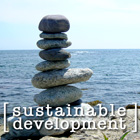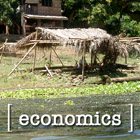
|
AN ECONOMY OF ERRORS: HOW ABUNDANCE MAY BRING SCARCITY The global economy in its present form is not only full of and forced to deal with problematic distortions; it has come to depend a great deal on the "bubble" effect of certain miscalculations and manipulations. Assumptions built into weak threads in the economic web mean that markets are not able to set prices or distribute wealth at sustainable levels. It must here be noted that the situation is such that —assuming this is what they key decision-makers seek— the "pure market" does not and cannot exist in the current economic and informative climate. In fact, taken together, the fundamental distortions embedded in the present global economic system are fueling the expansion of a complex bubble phenomenon, pressing against many natural limits, where in many key markets, the underlying resources are not sufficient to support the presumed direction or expansion of trade. Even as we hear about phenomenal advances of market principles and global wealth, key indicators show that the gap between rich and poor is widening, middle classes are either stagnant or declining, and the ability of the global economy to produce and deliver enough fuel, food, water, and basic services, is coming into question. Economists are projecting that petroleum, a finite, non-renewable resource for which demand increases sharply every year, will soon reach its production peak, and then decline into scarcity. Many populous nations are building up dangerous and unsustainable "water deficits" and China, which needs to feed 1.3 billion people, and formerly a leading exporter of grain to the world market, has suddenly become the world's biggest grain importer. Food, water, fossil fuels and arable land are all becoming more scarce on a per-capita basis already, and the coming peak in world oil production —whether or not the peak is imminent this year or next, it must come as a side-effect of petroleum reserves being finite— threatens to disrupt the ability of markets everywhere to forestall further declines in agricultural, extraction, industrial and transport productivity. The US food economy uses as much energy as France's total annual consumption for all purposes, with 20% going to growing and harvesting. The other 80% goes to transport, processing, packaging and storing food items during their journey to sale and consumption. The US is heavily dependent on petroleum for its food production, and increases in efficiency and production per acre have been helped along historically by increased use of petroleum, be it in pumps for extracting ground water or in heavy machinery. Dependence on petroleum for agricultural production and distribution has led to a serious economic distortion across world markets, in which prices are kept artificially low and food appears to be available at levels which are simply not sustainable. The distortion is problematic because it leads to a false sense of security and undermines the drive of the public and of government officials to push for research and development of new technologies and farming techniques. The Earth Policy Institute, whose director accurately predicted in the mid nineties that China would move from holding huge grain surpluses to a position of serious deficit which would drive it into the world import market for grainstocks, reported in 2003 that the world economy had produced a "food bubble", in which the availability and price of food was hiding likely shortages. The EPI report noted that water use is the problem factor in the food-production formula. EPI observes: "Aquifers are being depleted in scores of countries, including China, India, and the United States, which collectively account for half of the world grain harvest." In northwestern China, entire regions are falling prey to desertification, after which agriculture becomes virtually nonexistent, further diminishing foodstocks. Falling water tables mean, despite prospective advances in technology and efficiency, the planet is increasingly stressed in efforts to meet the nutrition needs of an extra 70 million inhabitants every year. That analysis can be applied to a number of key economic areas: unsustainability in resource use and waste release is generating —quite logically— an unsustainable economic picture. World markets are increasingly taxed as costs of shipping are escalating and major oil-exporting nations appear unable to provide adequate scientific evidence that reserves can match demand in coming years. At the base of all these channels of observation and analysis, we find the most problematic is the failure of traditional economics to take into account the value of goods and services provided by nature, and upon which the human commercial economy is entirely dependent. China has begun trying to remedy this miscalculation by evaluating the cost of providing flood protection services already carried out by nature in the form of forested mountainside and inland precipitation cycles. It turned out the value of a standing tree was far higher than that of one cut for timber. The cost of "privatized" well water in Cochabamba province, Bolivia, demonstrates the very problematic link between corporate profit expectations and local resource availability, usage requirements and income. Residents who used to share water according to centuries' old Quechua practices of "common usage" are suddenly faced with metered water supplies, entirely controlled by a foreign firm which charges rates equal to 1/3 of local per capita income. Such rates do not suggest healthy market conditions. Quite the contrary, the stresses placed on the local market to adequately meet basic needs are such that violence has repeatedly erupted in recent years in the face of failure to deliver affordable food and water resources to otherwise green, rural communities. Economies that depend on immigration to fill manual labor and entry-level service jobs, or which have done so, are faced with the crisis of "peripheries", also known as "inner cities" in the US, districts where concentrations of dissatisfied, underpriveleged minorities find the benefits of economic growth hard to come by. Britain saw citizens from such communities bombing London transport this summer after apparently being swayed to extremist perspectives, and France has seen nationwide incidents of arson and rioting, spreading even to neighboring countries, largely based on such economic marginalization. This crisis of peripheries requires that open societies, where personal freedom is valued in law and in practice, must address the challenge of integrating disparate communities into one coherent, functioning, tolerant community in which opportunity is not denied to anyone based on birth or origin. The failure of political leaders to seriously address this challenge during recent decades has led to the deep wounds that are now showing in France, as they did this past summer in New Orleans, and as they so often do in poorer countries. Sadly, disease is another area where economic markets are suffering and are likely to suffer increasing distortions. HIV/AIDS, Sleeping Sickness, Tuberculosis and Malaria, are killing millions in Africa, which is suffering grave population collapse amid its adult population. 36.8% of Botswana's population now carries the HIV infection, and most are expected to die. Only Swaziland has higher prevalence of the virus. Life expectancy has fallen to an unthinkable 39 years in the region. Investment in the manufacture and distribution of affordable AIDS drugs to poor, highly vulnerable subsaharan African nations, where the disease is killing millions and where efforts to stop its spread are faltering or inconsistent, could help stabilize these nations, their economies and their governments. In the absence of that aid, disease will lead to mass deprivation, increasing hunger and a likely spiral of disease, and ultimately to political instability. Corruption permits governments, or individuals within them, that actively steal from local enterprise and from foreign investors and aid agencies to remain in power and to manipulate regional markets, creating stagnant or non-existent real-world growth and political pitfalls where neither education nor investment is adequate to overcome the obstacles erected against the general welfare. Even today, with the abundance of analytic and financial information, major institutions continue to do "business as usual" with institutions whose remedies are either absent or utterly ineffective to curb and reverse the intense market distortions stemming from those erroneous calculations mentioned here, among others. The question is: how will governments, in concert with the advice and consent of their populations, and input from leading analysts, address the increasing scarcity of arable land and harvest yields, the pressures created by swiftly climbing world population, stresses on the productivity of oil, falling water tables, escalating climate change, and political instability posed by pandemic diseases, all simultaneously and in sustainable fashion? [s]
|
|||||||||||||||||||||
|
||||||||||||||||||||||







